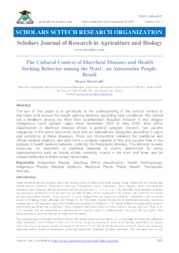The cultural context of diarrheal diseases and health seeking behavior among the Wari´, an Amazonian people, Brazil.
The cultural context of diarrheal diseases and health seeking behavior among the Wari´, an Amazonian people, Brazil.
Author(s): HAVERROTH, M.
Summary: The aim of this paper is to contribute to the understanding of the cultural context of diarrhoea, and discuss the health seeking behavior according local conditions. We carried out a fieldwork among the Wari from southwestern Brazilian Amazon in two villages (Indigenous Land IgarapéLage) since November 2002 to May 2003. Wari ethnoclassification of diarrheal disease shows a general category (honko?), four parallel categories in the same taxonomic level and six subordinate categories according to signs and symptoms of these diseases. There are intersections between the traditional and official medical systems, and both form a complex network of flow and counter flow in the process of health seeking behavior, outlining the therapeutic itinerary. The decision to seek resources for treatment of diarrheal diseases is mainly determined by some signs/symptoms such as bloody stools, vomiting, mucus in the stool and fever, and by causes attributed to illness along the process.
Publication year: 2019
Types of publication: Journal article
Unit: Embrapa Acre
Keywords: Amazonia Occidental, Amazônia Ocidental, Conducta cultural, Conhecimento tradicional, Conocimiento tradicional, Cultural behavior, Diarrea, Diarrhea, Diarréia, Digestive system diseases, Doença, Enfermedades del sistema digestivo, Enfermedades humanas, Human diseases, Indigenous knowledge, Indigenous peoples, Medical treatment, Pokaanóva, Povo indígena, Pueblos indígenas, Rondônia, Terra Indígena Igarapé Lage, Tratamento, Tratamientos médicos, Wari´, Western Amazon
Observation
Some of Embrapa's publications are published as ePub files. To read them, use or download one of the following free software options to your computer or mobile device. Android: Google Play Books; IOS: iBooks; Windows and Linux: Calibre.
Access other publications
Access the Agricultural Research Database (BDPA) to consult Embrapa's full library collection and records.
Visit Embrapa Bookstore to purchase books and other publications sold by Embrapa.

